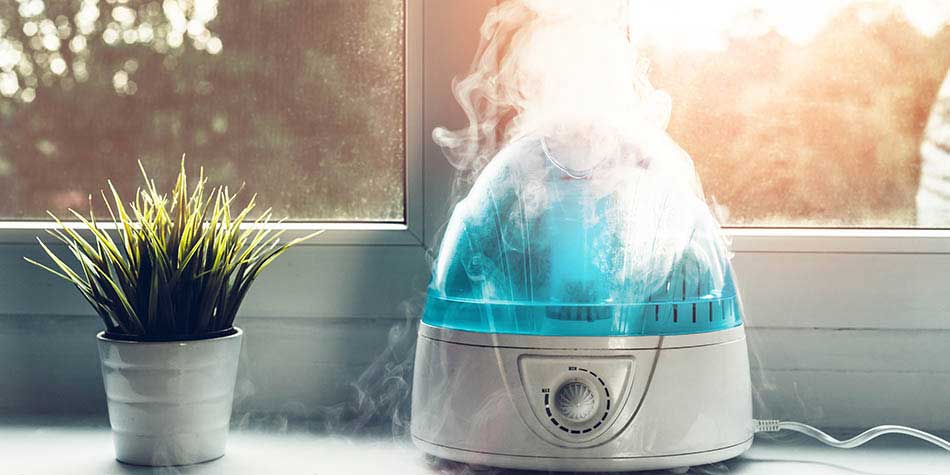
Sweater weather may bring cool breezes and crisp air—but it’s also the season of dry sinuses, chapped lips and other irritating symptoms.
The fact is, cold air doesn’t hold as much moisture as warm air, which is one reason your lips, nasal passages and skin tend to dry out when temperatures drop. Adding water vapor to the air in your home environment, however, can help ease this seasonal discomfort. Symptoms of other health issues that tend to flare up when the air gets colder or dry, such as dry eye or eczema, can also be improved when there is more moisture in the air. Using a humidifier could help—as long as you’re using it wisely.
Keep in mind, making the air in your home too humid can backfire, breeding potentially harmful mold and bacteria. Knowing how and when to use a humidifier correctly can help ensure that you find the right balance and get some relief.
How a humidifier could help
As its name implies, a humidifier is a machine that simply adds moisture to the air in your home.
By moistening the dry air that can irritate your airways, humidifiers can help ease the following health issues:
Nasal congestion
Low humidity could increase survival of the flu virus and its ability to infect people—not only outdoors but also indoors. And while a humidifier won’t help treat a cold or flu, a more humid environment could also make it easier for some people to cough up or blow out bothersome mucus that has accumulated in their airways. That mucus could result from either a cold or other viral illness or a bacterial infection. Even during winter, indoor allergens, including dust, mold and pet dander, can trigger allergy flare-ups.
Nose bleeds
The nose is lined with blood vessels that help warm and humidify the air you breathe in. But dry air or constant nose-blowing and rubbing can cause the nasal passages to become crusted, cracked and to bleed. Using a humidifier can help protect the nasal passages and prevent nosebleeds.
Dry, itchy skin
When the air is colder and dry, your skin can also become dry, flaky and itchy. In more severe cases, skin can become cracked and start bleeding. One skin condition in particular, called eczema, can also worsen when very dry air and indoor heaters take moisture from the skin. A humidifier could help you find some relief.
Dry eye
Millions of adults in the United States are affected by dry eye. In addition to colder temperatures and windy, dry weather, older age, wearing contact lenses and certain medical conditions or nutritional deficiencies can lead to dry eye. Using a humidifier is one way to help ease red, burning, scratchy or dry eyes.
When not to use a humidifier
On the flip side, too much moisture in the air can be risky, promoting the growth of mold and bacteria. This can have harmful health effects, particularly for those who have allergies and weakened immune systems.
Moist environments, which are breeding ground for germs, can lead to problems including infections and allergies. Dust mites—microscopic, insect-like pests that may trigger allergic reactions and asthma—also thrive in humid environments, absorbing moisture from the air.
If you have allergies or asthma, it’s a good idea to talk with your healthcare provider (HCP) before using a humidifier to discuss the potential risks and benefits.
People with compromised immune systems—including those who have undergone certain cancer treatments, are infected with HIV or have undergone a transplant surgery—should also check with their HCP before using a humidifier, as they’re at increased risk for infection.
Using a humidifier safely
If you decide to use a humidifier in your home or personal space, it’s important to follow some precautions to prevent infections and reduce certain health risks.
Use a cool-mist humidifier
This is particularly important if the machine is being placed inside a child’s room. Close contact with warm mist models can cause burns.
Keep the humidity level between 30 and 50 percent
Check the humidity level in the room with a hygrometer and be sure to set the machine at these levels.
Change the water daily
Bacteria can grow in standing water. You should replace the water in your humidifier every day. First, unplug the machine. Then empty its tank, dry the inside surfaces and refill the tank with clean water.
Only use pure or distilled water
Avoid using tap water, which contains minerals that can be released into the air and cause breathing problems. These minerals, which may promote bacterial growth, can also damage the machine itself.
Clean the machine (with a disinfectant) every 3 to 5 days
Be sure to unplug your humidifier. Next, use hydrogen peroxide or the disinfectant recommended by the machine’s manufacturer to clean the tank and any parts of the machine that water passes through.
Change the filter regularly
If your machine has a filter, follow the manufacturers’ instructions on how frequently to change it.
Keep a safe distance
If using a humidifier in a bedroom, position the machine several feet from the bed.
Avoid running a humidifier for prolonged periods of time
If the surfaces of the room are constantly wet or damp, it may promote the growth of mold and mildew.
Maintain your humidifier
If it’s used and maintained properly, a humidifier can last several years. During warmer months or when you know you won’t be using your machine for an extended period of time, unplug it and discard any remaining water in the tank. Clean and dry the machine as directed and remove and discard the filter. Then return the humidifier to its original box and store it in a cool, dry place.
This article originally appeared on Sharecare.com.
$webqFacilityNumber
Need a Physician?